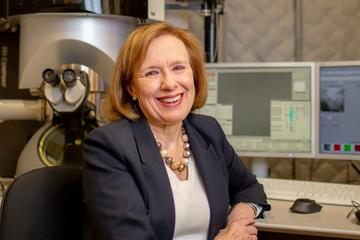Lectures and Seminars
Degree-course lecture lists are published termly under Teaching section of this website.
Materials Colloquia
Research seminar series organised by the Department of Materials
Thursdays 4pm Hume-Rothery Lecture Theatre.
The dates of the confirmed colloquia for 2025 - 2026 are:
Michaelmas Term 2025:
Special colloquium: (23 October 2025): Professor Chris Patrick (Warwick): 'Rare earth magnets at the atomistic scale'.
Week 3 (30 October 2025) Professor Jason Smith (Oxford): 'Science and engineering of point defects in diamond at the atomic scale'.
Week 4 (6 November 2025) Professor Jacqueline Edge (Imperial College, London). 'Where technology meets nature'.
Week 6 (20 November 2025) Professor Alejandro Gallegos Schmid (Manchester). 'Off-grid solar in Malawi: environmental impacts and circular economy solutions'. NB: this colloquium will start at the earlier time of 1:30pm.
Hilary Term 2026
Week 1 (22 January 2026) Professor Pete Nellist (Oxford Materials): 'Atomic scale imaging of beam sensitive materials: battery cathodes, hybrid perovskites and polymers'. Cancelled.
Week 3 (5 February 2026) Professor Katerina Christofidou CMBE (Sheffield) 'From Incremental Optimisation to High-Dimensional Exploration: Alloy Design for Extreme Environments'.
Week 5 (19 February 2026) Professor Peter A. Crozier (Arizona State University) 'Atomic-Level Probing of Structural Dynamics in Nanomaterials: Fluxionality and Functionality' (in-person only).
Week 5 (20 February 2026) Professor Bilge Yildiz (MIT) 'Computing with protons, and how to find better proton conductors' (in-person only).
Week 8 (12 March 2026) Professor Anthony Rollett (Carnegie Mellon University).
Trinity Term 2026
In addition there are numerous seminars by visiting researchers advertised via email.
Flagship Biennual Lectures
Hume-Rothery Lecture - 17th March 2025

Image by Wiley Analytical Science
(This lecture formed part of the celebrations in honour of the 100th Birthday of Professor Sir Peter Hirsch FRS).
Professor Grace Burke, Idaho National Laboratory
Title: 'Energy... Materials... Microscopy: enabling and advancing our understanding of materials performance in challenging environments'.
Abstract:
The need for energy is ever-increasing, and the importance of reliable low-C energy has significantly changed the landscape for nuclear power production. This includes not only existing nuclear reactor systems but also increased research into advanced Generation IV fission reactors and fusion. To address this issue, existing light water reactors are extending their operation, and there is consideration of 'Life after 80' and beyond. Thus, there is more focus on understanding the mechanisms of degradation, including the 'precursor' reactions so that modellers can incorporate such information into experimentally-informed mechanistically-based models to predict future performance in the challenging environment of a nuclear power plant. Microstructural characterisation using correlative techniques ranging from meso-scale to the nm-scale are thus vital. In addition, accelerated tests in relevant environments can be helpful in such endeavours, particularly with respect to focusing on the 'precursor' stage in environmentally-assisted cracking research.
In this lecture, the critical roles of both 'conventional' techniques (advanced scanning transmission electron microscopy - energy dispersive spectroscopy and spectrum imaging, in situ microscopy, and atom probe field-ion microscopy/atom probe tomography) will be demonstrated in the study of irradiation damage and environmentally-assisted cracking in steels and Ni-based alloys. Future considerations for nuclear materials research will also be discussed.
Venue: Lecture Room 1, Thom Building.
Hirsch Lecture 2024
Title: 'Neofossils: bio-based plastics to sequester CO2' .
Professor of Physical Chemistry, University of Sheffield
This lecture was held on Friday 12 January 2024.
Hume-Rothery Lecture 2023
Title: 'Multicomponent High-Entropy Cantor Alloys'.
Professor Brian Cantor.
Oxford University and the Brunel Centre for Advanced Solidification Technology (BCAST) Brunel University,
This lecture was held on Friday 21 April 2023.
Hirsch Lecture 2022
Title: 'From Batteries to Solar Cells: Exploring Energy Materials on the Atomic Scale' .
Professor Saiful Islam FRSC FIMMM.
Chair of Materials Modelling, University of Oxford
This lecture was held on Friday 14 January 2022.
Panopto recording (requires an Oxford account log-on) https://ox.cloud.panopto.eu/Panopto/Pages/Viewer.aspx?id=c93a81b8-bda8-4d74-8919-ae1500d17ed6.
Hume-Rothery Lecture 2021
Title: 'Microscopy and Magnetic Materials: Exploring Energy Landscapes at the Nanoscale'
Professor Amanda Petford-Long FREng.
Argonne National Laboratory and Northwestern University.
This lecture was held on Friday 15 January 2021.
Hirsch Lecture 2019
Title: Triboreacted materials as functional interfaces in internal combustion engines and medical implants
Professor Anne Neville OBE, FREng, FRS, FRSE
RAEng Chair in Emerging Technologies, and Professor of Tribology and Surface Engineering, University of Leeds
This lecture was held on Friday 8 February 2019.
Hume-Rothery Lecture 2018
Title: Damage-tolerance in engineering and biological materials
Professor Robert O. Richie FREng, ForMemRS.
Materials Sciences Division, Lawrence Berkeley National Laboratory, and Departments of Materials Science & Engineering and Mechanical Engineering, University of California Berkeley.
This lecture was held on Wednesday 24th January 2018.
Other Seminar Series in Oxford
Additional seminar series of interest organised elsewhere in the university include:


